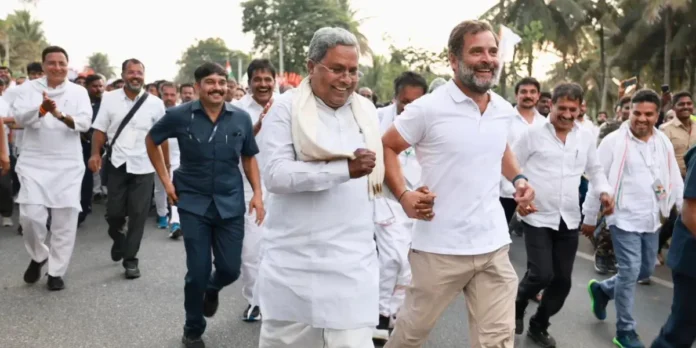Paromita Das
New Delhi, 14th July: It is often said that in politics, what is left unsaid carries more weight than any speech. This week in Karnataka, a quiet cold shoulder from Delhi has ignited a storm of whispers across the state’s political circles. Chief Minister Siddaramaiah, a veteran of state politics, openly admitted he flew to the capital hoping to meet Rahul Gandhi—but returned empty-handed. In the Congress, an unreturned call is rarely just poor scheduling; it’s often the start of something far bigger.
For the BJP, it was a golden moment handed on a platter. Amit Malviya wasted no time in drawing a stinging parallel between Siddaramaiah’s quiet rebuff and the humiliating sacking of Veerendra Patil by Rajiv Gandhi decades ago. For Congress, the old wound of central high command disrespecting regional stalwarts is once again wide open.
The Rift Beneath the Smiles

On paper, Siddaramaiah and his deputy, DK Shivakumar, have maintained a façade of perfect unity since leading Congress to power in Karnataka. But insiders have always known that this arrangement was stitched together with more ambition than trust. Siddaramaiah’s supporters say he has earned the right to complete his term. Yet Delhi’s silence has planted seeds of doubt that his long innings could end sooner than he imagined.
Whispers of a power-sharing pact have never truly died. Siddaramaiah’s sudden trip to Delhi—alone—and the awkward confession that he didn’t even get a slot in Rahul Gandhi’s crowded schedule, is being read as more than a slight. It’s a signal. Meanwhile, Shivakumar, ever the careful operator, only added to the suspense by refusing to give away anything beyond a cryptic, “It’s not good to speak again and again.” A line that says everything and nothing at once.
History Repeats for Congress
If the Congress high command is indeed laying the ground for a mid-term switch, the manner could not be more telling—or more damaging. Karnataka has not forgotten how Rajiv Gandhi dismissed Veerendra Patil in 1990, triggering resentment that cost the party dearly in the state for years. By sending Siddaramaiah back empty-handed, the Gandhis risk replaying that same arrogance that the BJP loves to showcase.
The party’s rank and file are restless too. One-on-one meetings called by party in-charge Randeep Singh Surjewala have only deepened suspicion. Officially, these chats are routine. Unofficially, they fuel the idea that a new loyalty test is underway—one that could clear the runway for DK Shivakumar to finally take the top seat he’s long coveted.
A Leadership Crisis, or an Opportunity?
If the Congress intends to manage this transition, it must do better than cold shoulders and whispers. Siddaramaiah has been the party’s strongest mass leader in Karnataka since the fall of the BJP’s Yediyurappa-led government. He holds sway over crucial backward class votes. To cut him down without a graceful exit could backfire spectacularly, especially when the BJP is hungry for a comeback storyline.
The Congress cannot afford to fumble its narrative now. Having returned to power in Karnataka after a hard fight, it must remember that its voters did not choose Delhi’s command—they chose local leaders who looked them in the eye. The high command’s invisible hand must tread carefully, or risk handing the BJP another propaganda weapon.
Silence Isn’t Strategy

Some argue that Rahul Gandhi’s refusal to meet Siddaramaiah is simply a matter of scheduling. But politics is never just about logistics. The Congress needs to learn that perception is everything. An ignored chief minister is not just a man waiting outside a door; he is a symbol of how Delhi still treats strong regional satraps as dispensable. If Congress wants to rebuild itself as a party that listens, respects, and adapts, it must stop replaying its worst habits.
The Message Behind the Missed Meeting
Whether or not Siddaramaiah survives the full term is no longer just about one leader’s political career. It’s about how Congress handles power, promises, and people. Rahul Gandhi’s silent snub has sparked speculation that the torch may soon pass to DK Shivakumar. But if the transition happens in the shadows, the echoes of Veerendra Patil’s sacking will haunt the party once again.
Karnataka voters are watching—closer than ever. In the end, the Congress will have to decide whether it wants to repeat its past or write a new chapter where loyalty is respected, leaders are valued, and the message is clear, not whispered.
The post Rahul Gandhi’s Snub Leaves Siddaramaiah on Shaky Ground appeared first on Global Governance News- Asia's First Bilingual News portal for Global News and Updates.



